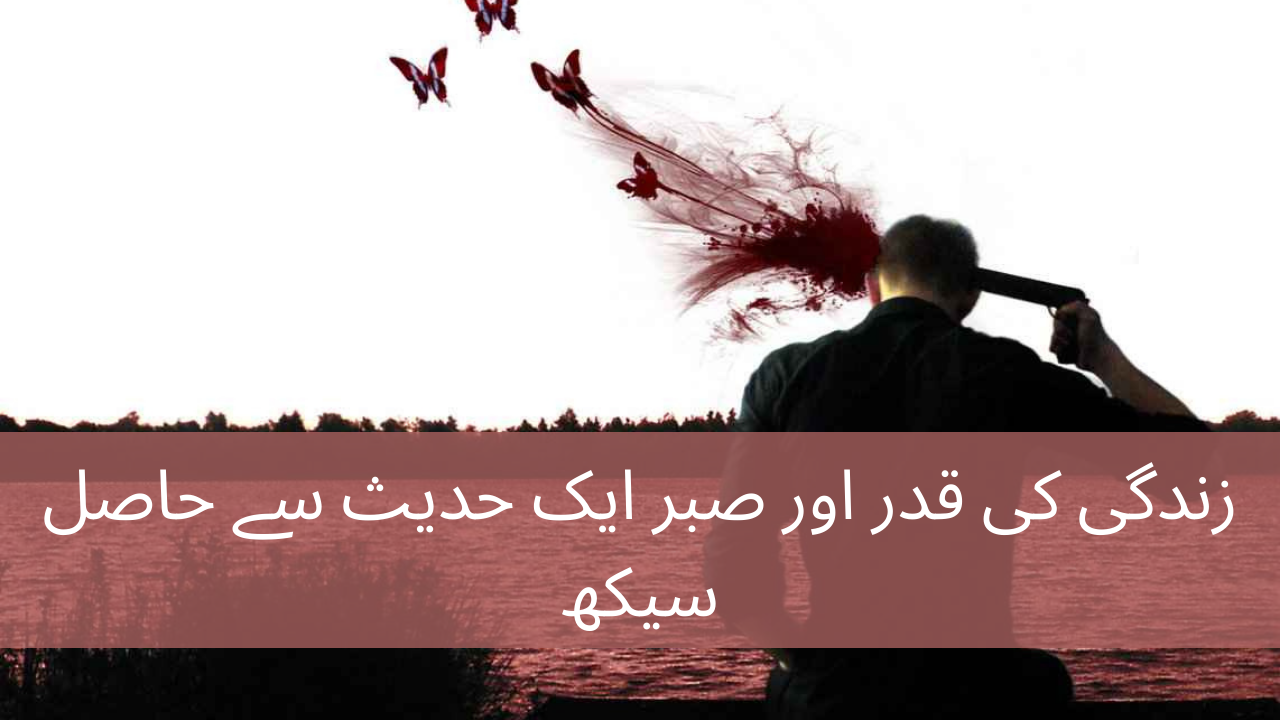The Prohibition of Suicide Lessons from a Hadith on Patience and Divine Wisdom

The Prohibition of Suicide Lessons from a Hadith on Patience and Divine Wisdom On the authority of Jundub ibn Abdullah (may Allah be pleased with him), who said that the Messenger of Allah (ﷺ) said
The Prohibition of Suicide Lessons from a Hadith on Patience and Divine Wisdom
There was amongst those before you a man who had a wound. He was in [such] anguish that he took a knife and made with it a cut in his hand, and the blood did not cease to flow till he died. Allah the Almighty said: My servant has himself forestalled Me; I have forbidden him Paradise. It was related by al-Bukhari.
:عَنْ جُنْدُبٍ بِن عَبْدِاللهِ رَضِيَ اللهُ عَنْهُ قَالَ : رَسُولُ اللهِ صَلَّى الله عَلَيْهِ وَ سَلَّمَ كَانَ فِيمَنْ كَانَ قَبْلَكُمْ رَجُلٌ بِهِ جُرْحٌ فَجَزِعَ فَأَخَذَ سِكِّينًا فَحَزَّ بِهَا يَدَهُ فَمَا رقَأَ الدَّمُ حَتَّى ماتَ قَالَ اللهُ تَعَالَى : بَادَرَنِي عَبْدِي بِنَفْسِهِ حَرَّمْتُ عَلَيْهِ الجَنَّةَ
رواه البخاري
In Arabic
عَنْ جُنْدُبٍ بِن عَبْدِاللهِ رَضِيَ اللهُ عَنْهُ قَالَ : رَسُولُ اللهِ صَلَّى الله عَلَيْهِ وَ سَلَّمَ كَانَ فِيمَنْ كَانَ قَبْلَكُمْ رَجُلٌ بِهِ جُرْحٌ فَجَزِعَ فَأَخَذَ سِكِّينًا فَحَزَّ بِهَا يَدَهُ فَمَا رقَأَ الدَّمُ حَتَّى ماتَ قَالَ اللهُ تَعَالَى : بَادَرَنِي عَبْدِي بِنَفْسِهِ حَرَّمْتُ عَلَيْهِ الجَنَّةَ
In Urdu
جندب بن عبداللہ رضی اللہ عنہ سے روایت ہے کہ وہ فرماتے ہیں: اللہ کے رسول صلی اللہ علیہ و آلہ وسلم نے فرمایا: “تم سے پہلے لوگوں میں ایک شخص تھا جس کو زخم آیا، اور اس نے افسوس کیا، پھر اس نے ایک چھری لی اور اس سے اپنے ہاتھ کاٹ لیا، جو خون بہتا رہا، حتیٰ کہ وہ مر گیا۔ اللہ تعالی نے فرمایا: ‘میرا بندہ نے میرے ساتھ بہادری دکھائی، میں نے اسے جنت حرام کردی ہے۔
In English
Narrated by Jundub ibn Abdullah, may Allah be pleased with him: The Messenger of Allah, peace be upon him, said, “There was a man among those who were before you who had a wound. He panicked, so he took a knife and cut his hand with it, and the blood did not cease to flow until he died. Allah, the Almighty, said: ‘My servant hastened to bring about his demise; I have forbidden Paradise to him.
This hadith illustrates several lessons and moral teachings
Preservation of Life
- The Prophet Muhammad (peace be upon him) highlights the severity of the act committed by the man who intentionally caused his own death. It emphasizes the sanctity and value of human life in Islam.
Prohibition of Suicide
- The hadith explicitly condemns the act of intentionally causing harm to oneself to the extent of death. Suicide is considered a grave sin in Islam, and this narration reinforces the prohibition against taking one’s own life.
Patience in Difficult Times
- Instead of resorting to self-harm or despair during challenging situations, Muslims are encouraged to exercise patience and seek Allah’s help. Cutting one’s hand in a moment of panic is portrayed as an inappropriate and extreme reaction.
Divine Judgment
- The hadith underscores the concept of divine judgment. Allah is portrayed as the ultimate judge who evaluates the actions and intentions of His servants. In this case, the man’s impulsive act led to the divine prohibition of Paradise for him.
Appreciation for Life’s Trials
- It encourages believers to face life’s challenges with patience and reliance on Allah rather than resorting to drastic measures. Trials and difficulties are seen as opportunities for spiritual growth and patience.
Teaching Against Self-Harm
- The hadith indirectly discourages any form of self-harm or mutilation. Islam promotes the well-being of the individual, both physically and mentally.
Understanding Divine Wisdom
- The narration invites reflection on the wisdom behind divine commands and prohibitions. Allah’s wisdom may not always be immediately apparent, but believers are urged to trust in His knowledge and guidance.
In summary, this hadith serves as a source of guidance for Muslims, emphasizing the sanctity of life, the prohibition of suicide, the importance of patience, and the consequences of impulsive actions. It encourages a holistic and balanced approach to facing life’s challenges while relying on Allah’s guidance and mercy.
Conclusion
he hadith about the man who caused his own death through self-inflicted harm imparts valuable lessons in Islam. It emphasizes the sanctity of human life, strongly prohibits suicide, and underscores the importance of patience during difficult times. The narrative serves as a reminder of the consequences of impulsive actions and the need for trust in divine wisdom.
Ultimately, it encourages believers to appreciate the trials of life, seek guidance from Allah, and avoid self-harm or actions that jeopardize the gift of life. Through these teachings, the hadith contributes to the moral and spiritual development of individuals within the Islamic framework.





